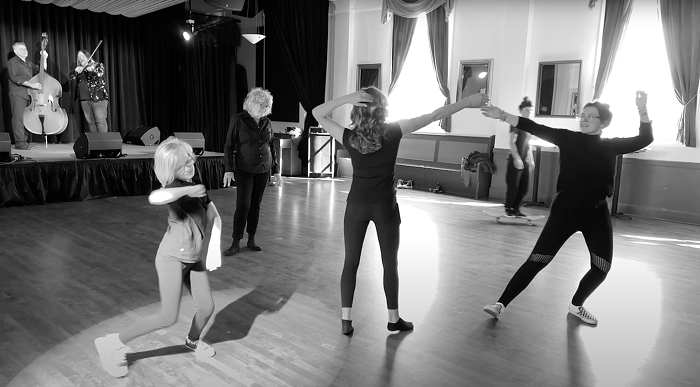IT'S NOT EASY to tell you this, but 2016 isn't going to be perfect. It's going to be just as difficult, as trying, and as painful as every other year you've had so far. Yes, there will be triumphs and celebrations and plenty of wonderful things to keep you from tumbling off the precipice of despair. But let's not sugarcoat it: Life is difficult and confusing, and—occasionally—rewarding.
No pop group knows about these challenges better than ABBA. The '70s superstars were made up of two attractive Swedish couples—the girls sang, the boys wrote—and they reached enormous global success. Naturally, both marriages hit the rocks, and you can hear their disillusionment and wisdom grow across the group's eight albums. Taken as a whole, ABBA's catalog is a fascinating microcosm of the human experience, filled with silly love songs, badly phrased English, devastating breakups, and—eventually—the perspective that comes with age and experience. Often criticized for their chilly Nordic reserve, there's actually enough heat, humor, and horror in these songs to fill up your year and then some. Here's how to let ABBA guide you through 2016.
JANUARY 1: "Happy New Year" (Super Trouper, 1980)—You'd think a New Year's-themed song would be filled with some kind of hopeful spark. Nope. ABBA's ballad to mark the turning of the calendar page is a dismal, depressive tune about putting on a brave face even though life continues to suck, no matter what year it is. "May we all have our hopes, our will to try," Agnetha Fältskog and Frida Lyngstad sing determinedly. "If we don't, we might as well lay down and die."
FEBRUARY 13: "The Winner Takes It All" (Super Trouper, 1980)—The day before Valentine's Day is the perfect time of year to wallow in what might be the greatest breakup song ever written. Björn Ulvaeus wrote the words as he was getting divorced from Agnetha, and she gives his lyrics a heroic, doomed sense of drama. "Tell me, does she kiss like I used to kiss you?" Agnetha sings into a very expensive studio microphone, as her soon-to-be-ex-husband sits on the other side of a glass window in the control room, before going home to his new girlfriend. We hear everything in Agnetha's voice: Love is a death match, and the victor gets the spoils; the rest of us are fated to perish on the battlefield.
APRIL 26: "Mamma Mia" (ABBA, 1975)—Something called Hug an Australian Day happens on April 26, and no other nation on earth succumbed to ABBAmania as deeply and devotedly as Australia. During the initial height of their Down Under takeover, "Mamma Mia" soared to number one and stayed there for 10 weeks. It contains everything that made ABBA so enormously appealing: a perfect blend of rock and pop, hooks stacked high like Jenga blocks, and lyrics that convey internal conflict and the foolhardiness of romance. Even as "Mamma Mia" depicts a man's cheating ways, its chorus comes to an inevitable conclusion: "How can I resist you?"
MAY 1: "Knowing Me, Knowing You" (Arrival, 1976) and "The Name of the Game" (ABBA: The Album, 1977)—On May Day, Sweden celebrates International Workers' Day, evidence of the nation's long history with the Social Democratic Party that has dominated Swedish politics for the last 100 years or so. Björn and Benny Andersson's songwriting skills are the result of their devotion to hard work—the two would often sequester themselves in a small island cabin for days on end, honing each line and lyric until it was absolutely perfect. So today's the right day for celebrating two of their most perfectly written songs: "Knowing Me, Knowing You" (whose whispered lines and repeated "ah-has" are a sauna for your soul) and "The Name of the Game" (which turns a therapy session into a neurotically sexy hymn).
MAY 14: "Ring Ring" (Ring Ring, 1973)—Today's the day of 2016's Eurovision Song Contest, the competition that originally thrust ABBA into international fame back in 1974 with their song "Waterloo" (more on that in a minute). ABBA actually first entered the contest in 1973 with "Ring Ring," a joyous, sonically dense Phil Spector homage and one of the finest glam-rock singles of the early '70s. "Ring Ring" didn't win the Swedish division, though, so ABBA never made it to the Eurovision finals, but here is where the group's story truly begins. It's just as good a song as "Waterloo," dammit.
JUNE 3: "Slipping Through My Fingers" (The Visitors, 1981)—Graduation season starts this week, and this late-period ABBA ballad laments a young daughter growing up far too quickly. Somewhat creepily, Agnetha and Frida sing this one in their most childlike voices, but the melancholy runs deep. Just listening to this song is like watching a slow-motion montage of airbrushed photos. It's schmaltz, but heartfelt schmaltz. Don't resist. Lean into the sentiment. Your little girl's growing up, for chrissake.
JUNE 18: "Waterloo" (Waterloo, 1974)—On this date, English and Prussian armies triumphed over Napoleon at the Battle of Waterloo. ABBA's Eurovision-winning song turns that defeat into an illustration of romantic surrender. "How could I ever refuse?" Frida and Agnetha chirp in unison. "I feel like I win when I lose." Kind of a creepy parallel to draw, when you think about it. The fallout of this battle-as-metaphor-for-love would be heard years later on "The Winner Takes It All."
JULY 10: "Summer Night City" (single, 1978)—One of the group's least favorite songs, this frenzied disco tune is meant to be a go-wild dance number, but in practce it's stiff as a board. It'd be easy to criticize the Swedes' lack of warmth, but there's something hilarious about "Summer Night City" and its inability to cut loose. Its generic title, too, sounds as if it were created by a songwriting robot with minimal exposure to actual humans. This is a song for staying in on a Saturday night during summertime, and feeling just fine about it.
AUGUST 31: "When I Kissed the Teacher" (Arrival, 1976)—Today's the first day of school, a perfect time for ABBA's sweet, naïve ode to the teacher. Instead of a crisp round apple, Agnetha and Frida give the object of their affection a firm plant on the lips. "Gonna teach him a lesson all right," the chorus threatens, depicting a rather obsessive puppy love that may or may not be one-sided. Hmm. Actually, this song is kind of messed up.
NOVEMBER 20: "Fernando" (single, 1976)—Today is Mexico's Día de la Revolución, commemorating the Mexican Revolution and the rise of agrarian campesinos against the country's corrupt politicians. ABBA's "Fernando" contains almost no political intrigue, but uses the Revolucíon as a backdrop for a sentimental, nostalgic tune with a patriotic (but non-nation-specific) jangle. "If I had to do the same again, I would, my friend," Frida sings cryptically. Dear god, what did the war force her to do? Did she raid a small, innocent village? Did she shoot a child? Did she cut off Fernando's leg to save him from gangrene? It remains unclear, but ABBA's obsession with wartime imagery becomes yet another weirdly romantic track, one of the group's best.
DECEMBER 25: "Nu Är Det Jul Igen" (Mal Sondock's Hitparade, 1981)—ABBA never recorded a Christmas song, a fact that's the very definition of "missed opportunity." (It ranks second in The Great Big Book of ABBA Missed Opportunities, right underneath the tragic fact that Benny and Björn never wrote a theme song for a James Bond movie.) However, ABBA did appear on a West German radio show to sing this Swedish Christmas song, which remains the closest thing to a holiday tune in their catalog. Never officially released on an ABBA album, "Nu Är Det Jul Igen" is drippy, slow, sad, and regretful—exactly like you'd imagine a holiday filled with too much glögg and ginger snaps.



















